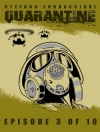May 1970, freelance human rights investigator John Alexander rides on horseback, away from the scene of his latest mission. Flames engulf the second story of the Hacienda Atalaya in southern Ecuador’s Santa Isabel district that Alexander and a local named Efraín have just set ablaze. Their arson is not just a typical job in Alexander’s ‘human rights’ campaign. It is a symbolic burning of the powerful Veintimita clan’s shady politics and exploitation of the local peasantry. A hired snitch who has investigated the international sex trade, agribusiness scandals, shady elections, and political murders for various foundations’ boards, Alexander is a single guy with two American passports, a British residency card, a master’s degree in folklore from Edinburgh, and an attitude.
Dark and fast-paced, The Ecuador Effect combines a liberal dose of Ecuadorian/Quechua Indian culture with the drama of a novel. David Stuart fictionalizes major events he witnessed while doing anthropological fieldwork in Ecuador and shares the real-life struggles of the cholos, the mestizos, and the indios in their attempts to maintain their working-class livelihoods in a strikingly stratified society that pushes them out of their traditional settlements.
PEN Southwest 2007 fiction finalist
Giới thiệu về tác giả
David E. Stuart, the first student in the State of West Virginia to earn a degree in Anthropology, came to UNM in ’67/’68 where he earned the Masters and Ph.D. and, later, an honorary doctorate from WVa Wesleyan College. He has conducted fieldwork in Mexico, Alaska, Ecuador, and the American Southwest, where he continues to publish in both Anthropology and Archaeology. He served the University of New Mexico as a senior academic administrator for many years, and still teaches the Archaeology of New Mexico.












